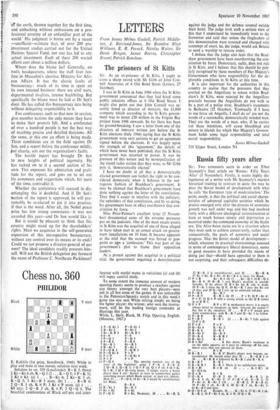The prisoners of St Kitts
LETTERS
From James Milnes Gaskell, Patrick Middle- ton, J. Rowland-Jones, Sir Brandon Rhys Williams, E. R. Pocock. Nicolas Walter, Sir Denis Brogan, James Reeves, Christopher Brunel, Patrick Renshaw.
Sir: As an ex-prisoner of St Kitts, I ought to cross a sharp sword with Mr Gibb of John Con- nell Associates of 6 Old Bond Street (Letters, 27 October).
I was in St Kitts in June 1966 when the St Kitts government announced that they had hired some public relations offices at 6 Old Bond Street. might also point out that John Connell was re- cently listed as director of MUM, the £1,000 company which according to the St Kitts govern- ment was to invest £20 million in the Frigate Bay project from 1966 onwards. So far there has been no ground-breaking. I saw a letter from one of the directors of INDELCO written just before the St Kitts elections (July 1966) saying that the St Kitts government were very anxious to get an agreement signed before the elections. It was largely upon the strength of this 'agreement,' the details of which have never been published, that the St Kitts government was returned to power. It was by pressure of this nature and by monopolisation of the island radio station that they were, as Mr Gibb puts it, 'democratically elected.'
I have no doubt at all that a democratically elected government can forfeit the right to be con- sidered democratic when it behaves in the out- rageous fashion of Bradshaw's government. It may be claimed that Bradshaw's government have done nothing against the letter of the constitution. They find it easier to interfere with the judiciary, the upholders of that constitution, and by so doing, his government have in effect overthrown that con- stitution by force.
Miss Prior-Palmer's excellent letter (3 Novem- ber) documented some of the extreme pressures put on the judiciary. One of the most recent events in St Kitts was the acquittal of one of those alleged to have taken part in an armed attack on govern- ment installations on 10 June. It became apparent at the trial that the accused was forced at gun- point to sign a 'confession.' This was part of the government's plot to frame their opposition leaders.
As a protest against this acquittal in a political trial, the government organised a demonstration
against the judge and the defence counsel outside their hotel. The judge took such a serious view of this that I understand he immediately went to the Governor and said that unless the ringleaders of this demonstration were arrested and charged With contempt of court, he, the judge, would ask Britain to send a warship to restore order.
I deduce that the judge also feels that the Brad- shaw government have been overthrowing the con- stitution by force. Democracy, sadly, does not rule in St Kitts, and I believe that this should be pub- licly recognised by those members of Her Majesty's Government who have responsibility for the de- plorable conditions in St Kitts at this time.
It is also important for the authorities in this country to realise that the pressures that they exerted on the Anguillans to return within Brad- shaw's St Kitts, were rejected by the Anguillans precisely because the Anguillans do not wish to be a part of a police state. Bradshaw's statements in Barbados (22 October), 'Eventually if I have to use force on Anguilla, I shall do so' are not the words of a reasonable, democratically minded man. They are the words of a man, who, if he carries out these intentions, will cause bloodshed and misery in islands for which Her Majesty's Govern- ment holds some legal responsibility and total moral responsibility.






































 Previous page
Previous page